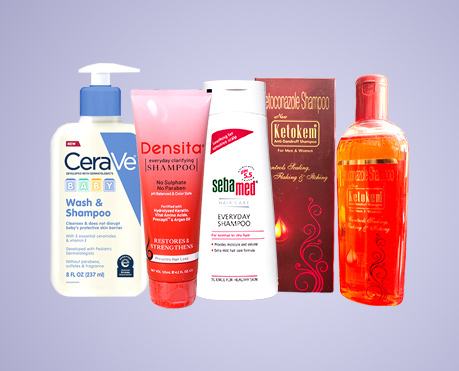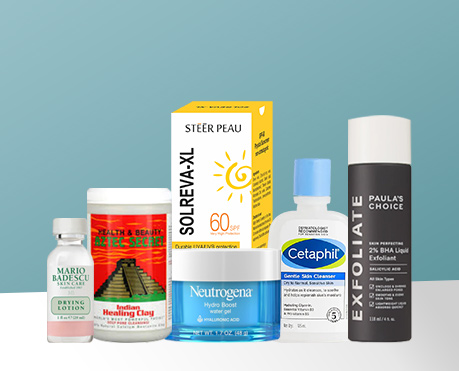Which Type of Shampoo Is Good for Hair 2025
Which Type of Shampoo Is Good for Hair 2025
Find which type of shampoo is best for your hair in 2025. Tips for all hair types and needs to keep your locks healthy and vibrant.

Choosing the right shampoo is important for healthy hair. With so many options, it can be difficult to find the best shampoo for your specific hair type and needs.
In this comprehensive guide, we will help you understand which shampoo is good for your hair by breaking down the key factors to consider and explaining the best choices based on different hair types.
Understanding the Importance of Choosing the Right Shampoo
Your shampoo is more than just a conditioner; It plays an important role in overall hair health. The wrong shampoo can strip your hair of its natural oils, cause breakage, or cause problems with your hair.
On the other hand, the right shampoo can condition your hair, strengthen your strands and improve your hair.
1. Fine Hair
Fine hair tends to be thin and lacks volume. The wrong shampoo can weigh it down, making it appear flat and lifeless. Volumizing shampoos are ideal for fine hair, as they are lightweight and help lift the hair from the roots. Look for formulas that are free of heavy silicones and oils, which can further flatten the hair.
2. Curly or Wavy Hair
Curly and wavy hair types are often prone to dryness and frizz because the natural oils from the scalp have a harder time traveling down the twists and turns of the hair shaft. Moisturizing shampoos that contain hydrating ingredients like shea butter, coconut oil, and glycerin are best for curly or wavy hair. Avoid sulfates, as they can strip moisture from the hair.
3. Oily Hair
People with oily hair often struggle with greasiness and buildup. Clarifying shampoos are perfect for oily hair types, as they help to remove excess oil and product buildup from the scalp. Look for ingredients like tea tree oil, which is known for its ability to balance oil production. However, use clarifying shampoos sparingly to avoid over-drying your scalp.
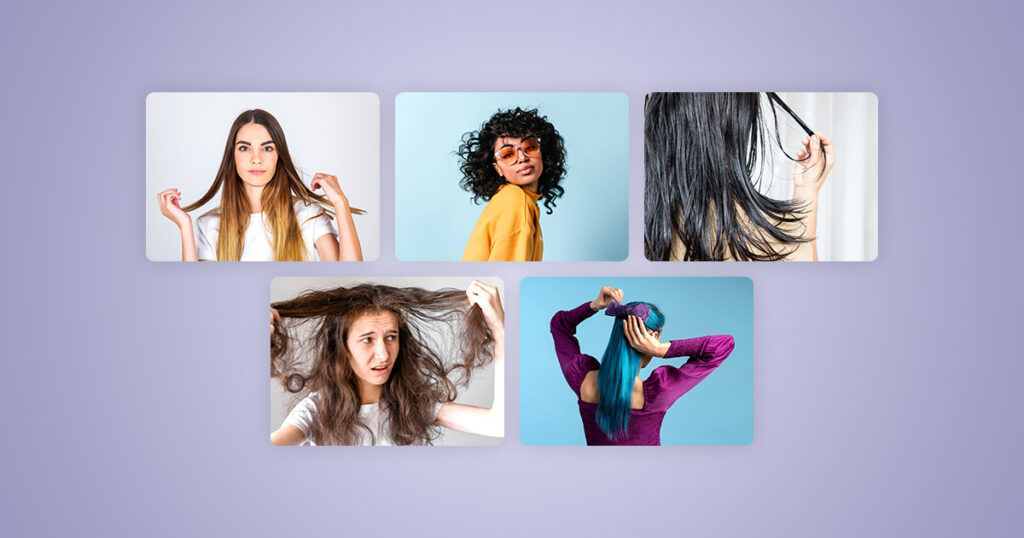
4. Dry or Damaged Hair
Dry or damaged hair requires extra nourishment to restore its health. Repairing or hydrating shampoos enriched with proteins, ceramides, and oils are the best choices for this hair type. Look for shampoos with ingredients like argan oil, keratin, or silk proteins, which help to repair and protect the hair from further damage.
5. Color-Treated Hair
Color-treated hair requires special care to maintain the vibrancy of the color and prevent fading. Color-protecting shampoos are formulated with gentle, sulfate-free cleansers that preserve hair color. Ingredients like UV filters and antioxidants can also help protect the hair from environmental damage that causes color to fade.
In addition to choosing the right shampoo for your hair, it is important to pay attention to the ingredients. Here are some basic things to look for depending on your hair needs:
Key Ingredients to Look for in Shampoos
For hydration: Shea butter, coconut oil, argan oil and glycerin are all great for adding moisture to dry or frizzy hair.
For strength: Proteins such as keratin and silk protein help to strengthen hair, making it ideal for damaged or thinning hair.
For volume: Lightweight ingredients such as panthenol and rice protein help with volume without being thick.
To protect color: UV filters, antioxidants and sulfate-free chemicals protect hair color from fading and environmental damage. For hair health: Tea tree oil, salicylic acid and peppermint oil help keep hair healthy and free of dandruff.

Shampoo Ingredients to Avoid
While it’s important to know what to look for, it’s equally important to know what products can harm your hair. Avoid the following if possible.
Parabens: These preservatives have been linked to potential health risks and can cause scalp irritation.
Silicone: While silicone can make hair look greasy, it builds up over time, making hair less heavy and brittle.
Alcohol: Some alcoholic beverages can dry out your hair, leading to brittle and brittle hair. Look for shampoos that use fatty alcohols like cetyl or stearyl alcohols which are more beneficial for your hair.
Choosing the Right Shampoo Based on Scalp Condition
While your hair type is important, your scalp condition also plays a critical role in determining which shampoo is best for you. Here’s how to choose a shampoo based on common scalp issues:
1. Dry Scalp
A dry scalp can cause itching and flaking, similar to dandruff. For this condition, opt for moisturizing shampoos that contain soothing ingredients like aloe vera, tea tree oil, or oatmeal. Avoid shampoos with harsh sulfates that can further dry out the scalp.
Examples : Hair 4 U, Densita shampoo
2. Oily Scalp
An oily scalp can lead to greasy hair and even scalp acne. Regular sulphated shampoos with ingredients like salicylic acid or peppermint oil can help balance oil production. However, be cautious of over-washing, as it can cause the scalp to produce even more oil.
Examples : Sebamed everyday shampoo, The ordinary hair care
3. Sensitive Scalp
For those with a sensitive scalp, it’s best to choose hypoallergenic shampoos that are free of fragrances, dyes, and harsh chemicals. Look for shampoos labeled as gentle or soothing to minimize irritation.
4. Dandruff
Dandruff is often caused by an overgrowth of yeast on the scalp, which leads to flaking and itching. Anti-dandruff shampoos containing active ingredients like zinc pyrithione, ketoconazole, or selenium sulfide can help control dandruff and soothe the scalp.
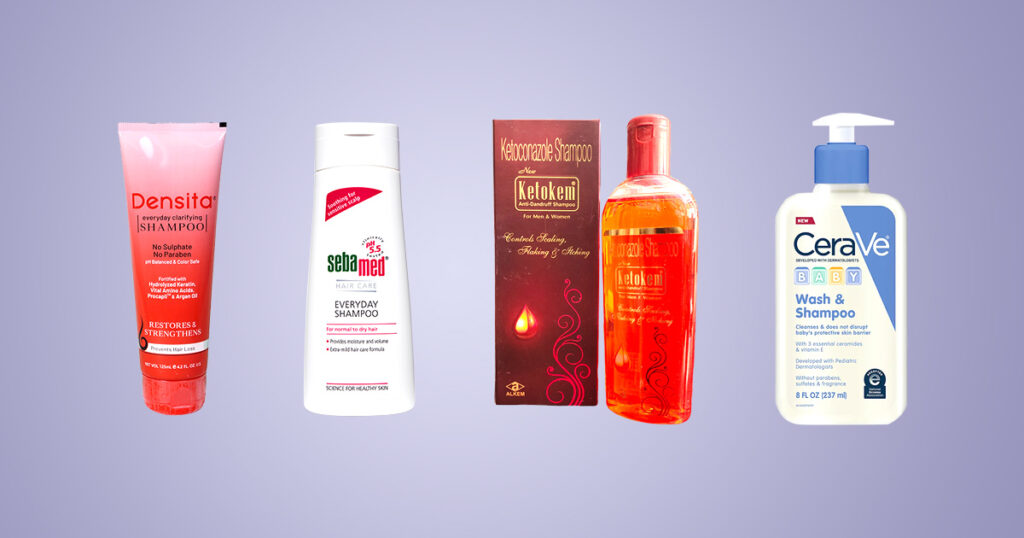
Why Choose Dr. Hanan Dermatology Specialty Clinic for Good Hair?
At Dr. Hanan Dermatology Specialty Clinic, we offer expert advice and treatments tailored to your hair type. Our specialized care ensures your hair stays healthy and looks its best.
Choose us for professional, personalized hair care.
Conclusion
Choosing the right shampoo is important to maintain the health and look of your hair.
By understanding hair type, hair condition, and styling products, you can make an informed decision on whether your hair needs moisture, volume, strength, or color protection to look its best each, and there’s a shampoo for every hair type and need .
Remember to avoid harsh products that can damage your hair, and always choose a shampoo that matches your specific hair goals.
FAQ’s
Yes, sulfate-free shampoos are gentler on the scalp and hair. They’re ideal if you have sensitive skin or color-treated hair since they prevent dryness and fading.
It's generally fine to stick to one shampoo if it works for you. However, switching up your shampoo occasionally can help address different hair needs, such as hydration or volume.
Natural shampoos can be gentler and free from harsh chemicals. If you prefer a more eco-friendly option, choose shampoos with natural ingredients like coconut oil or aloe vera.
Table of Contents
What Is Psoriasis and How to Get Rid of It
What Is Psoriasis and How to Get Rid of It
Learn what psoriasis is and discover simple tips on how to manage and reduce symptoms for smoother skin. Read now for relief!

Psoriasis is a long-term skin condition that affects many people worldwide. It’s an autoimmune disease that causes skin cells to grow too quickly, forming thick, scaly patches.
These patches, or plaques, can be red, inflamed, and painful. They often appear on the wrists, knees, scalp, and lower back but can be anywhere on the body.
This article explains what psoriasis is and looks at treatments to help manage its symptoms.
What causes psoriasis?
Psoriasis occurs when the immune system mistakenly attacks healthy skin cells, causing new skin cells to form quickly.
Normally, skin cells grow and shed every 28 to 30 days, but in psoriasis this process can take only 3 to 4 days. The wrinkles are formed by the rapid accumulation of skin cells.
Although the exact causes of psoriasis are not fully understood, several factors can trigger or exacerbate the condition:
- Heredity: Psoriasis tends to run in families. If one or both of your parents have psoriasis, you are more likely to develop it.
- Immune system dysfunction: Since psoriasis is an autoimmune disease, the immune system plays an important role. Abnormal immune responses lead to inflammation and rapid skin cell turnover.
- Environmental triggers: Stress, skin injuries, infections (such as strep throat), and certain medications can cause flare-ups.
- Lifestyle factors: Smoking, excessive alcohol consumption and obesity can aggravate symptoms.

Types of Psoriasis
There are several types of psoriasis, each with its own characteristics:
1. Plaque Psoriasis: The most common form, characterized by raised, red patches covered with silvery scales. These plaques can appear anywhere on the body.
2. Guttate Psoriasis: This type appears as small, dot-like lesions, usually triggered by bacterial infections like strep throat.
3. Inverse Psoriasis: Found in body folds such as the armpits, groin, and under the breasts, this type appears as smooth, red patches that worsen with friction and sweating.
4. Pustular Psoriasis: Characterized by white pustules (blisters of non-infectious pus) surrounded by red skin. It can appear on specific areas, such as the hands and feet, or cover the entire body.
5. Erythrodermic Psoriasis: A rare but severe form of psoriasis that causes widespread redness, scaling, and pain across the body. It requires immediate medical attention.
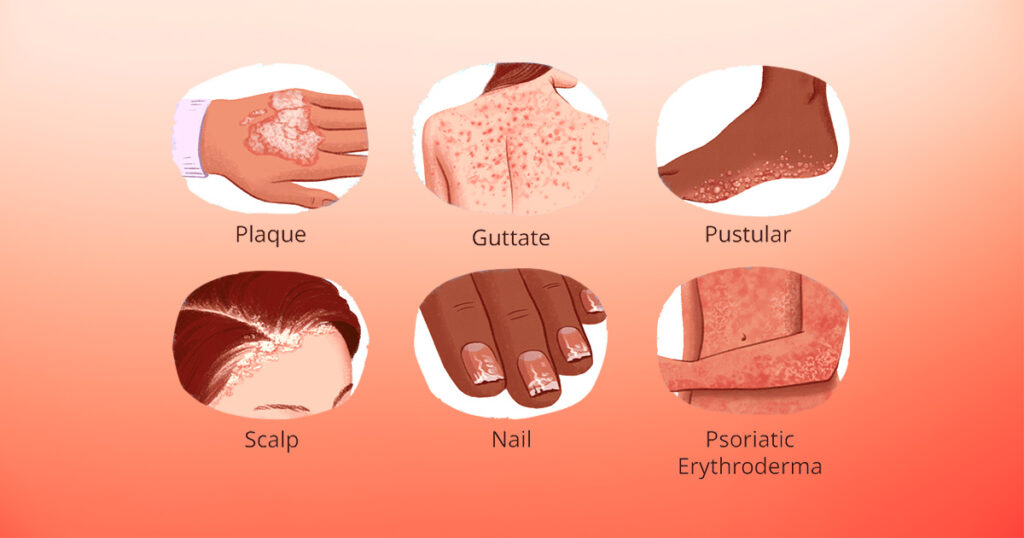
Symptoms of psoriasis
Psoriasis symptoms can vary depending on the type and severity. Common symptoms include:
- Red patches of skin covered with thick silver scales
- Dry and cracked skin that can cause bleeding
- Itching, burning, or soreness
- Thickened or ridged nails
- Stiff and swollen joints (in cases of psoriatic arthritis)
Symptoms range from mild, affecting only a small area of the skin, to severe, involving large areas, and significantly affecting quality of life.
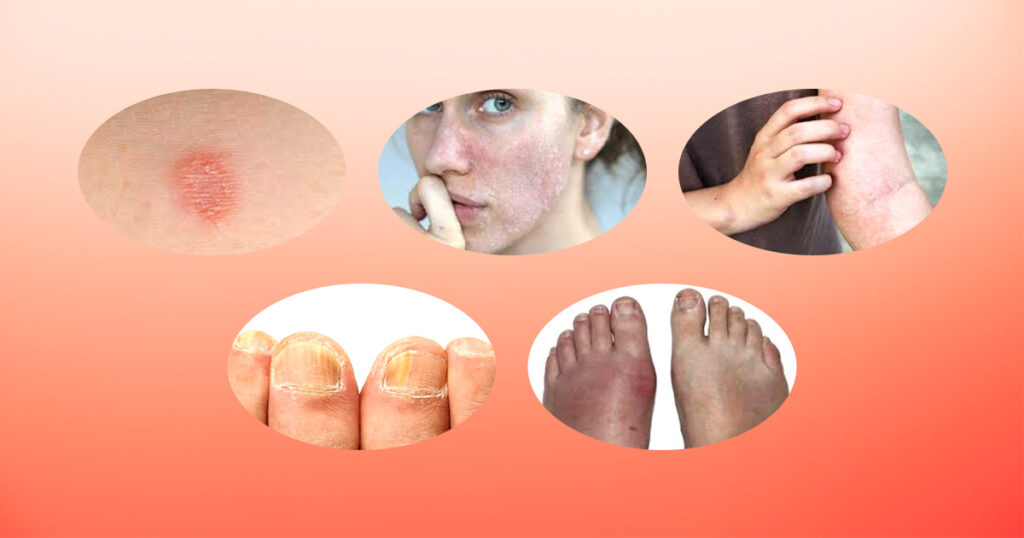
How to Get Rid of Psoriasis: Treatment Options
Several treatments are available to help manage the symptoms and reduce flare-ups. Treatment typically depends on the type and severity of the condition, and it may involve a combination of therapies.
1. Topical treatment
Topical treatments are often the first line of defense against mild to moderate psoriasis. These products are applied directly to the skin and can help reduce inflammation and slow the growth of skin cells.
- Corticosteroids: These anti-inflammatory medications and ointments are commonly used to treat mild forms of psoriasis. They reduce redness and inflammation and help relieve pain.
- Vitamin D analogs: These synthetic forms of vitamin D, such as calcipotriene, help slow the growth of skin cells.
- Retinoids: Topical retinoids, such as whole wheat germ, help exfoliate dead skin cells and reduce inflammation.
- Charcoal tar: This treatment helps reduce grease, pain and inflammation. It is also available in shampoos, creams and oils.
- Moisturizer: While not really a cure, it is essential by keeping the skin well moisturized to prevent dryness and cracking.
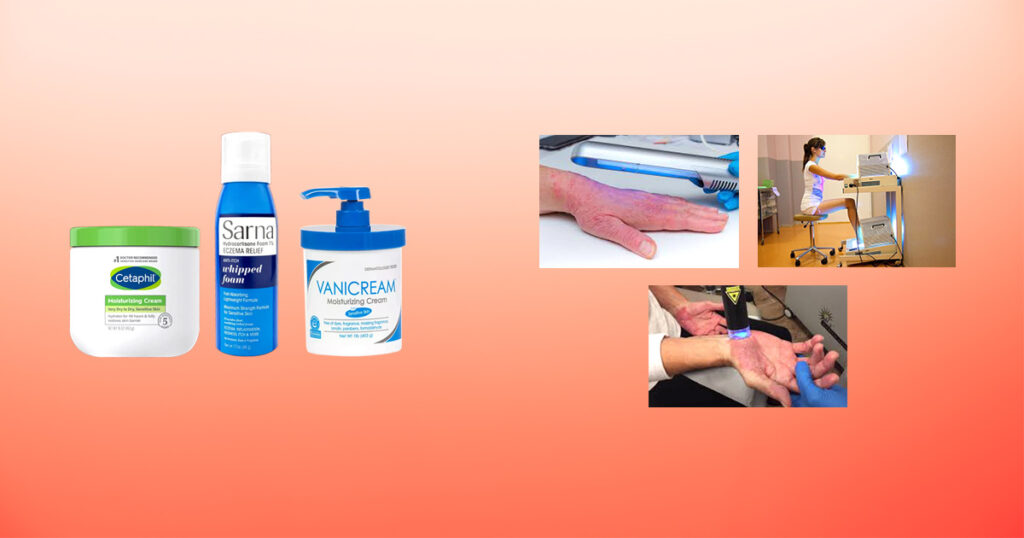
2. Phototherapy (Light Therapy)
Phototherapy involves exposing the skin to controlled amounts of ultraviolet (UV) light. This treatment can help slow the growth of skin cells and reduce inflammation.
- UVB Phototherapy: This is the most common form of light therapy, using UVB light to treat affected areas. It can be administered in a doctor’s office or with a home phototherapy unit.
- PUVA Therapy: This involves combining a medication called psoralen with UVA light. The psoralen makes the skin more sensitive to light, enhancing the effectiveness of the treatment.
- Excimer Laser: This laser treatment delivers high-intensity UVB light to specific areas of the skin, targeting plaques without affecting surrounding healthy skin.
3. Systemic Medications
For moderate to severe psoriasis, systemic medications may be prescribed when other treatments are ineffective. These can be taken orally or injected and work throughout the body.
- Biologics: These drugs, such as adalimumab, etanercept and infliximab, target specific aspects of the immune system to reduce inflammation and slow the progression of psoriasis
- Methotrexate: This drug suppresses the immune system and reduces skin cell production and inflammation.
- Cyclosporine: Another immunomodulatory drug, cyclosporine, can be effective in severe cases but is often used for short periods of time because of possible side effects
- Oral retinoids: These are related to vitamin A and can help reduce skin cell production. Acitretin is commonly used in severe psoriasis.

4. Lifestyle and home remedies
In addition to medication, lifestyle changes and home remedies play an important role in the management of psoriasis:
- Moisturize Regularly: Fresh water can dehydrate your skin and cause dry, itchy skin.
- Manage stress: Stress is a well-known trigger for psoriasis flares, so incorporating relaxation techniques such as meditation, yoga and deep breathing can be beneficial
- A healthy diet: Eating a well-balanced diet rich in antioxidant foods like fruits, vegetables and omega-3 fatty acids can help reduce inflammation
- Avoid Triggers: Identify and avoid specific triggers that can worsen your symptoms, such as smoking, alcohol abuse, and certain foods.
Why Choose Dr. Hanan Dermatology Specialty Clinic for Best Psoriasis Treatment in Chennai ?
Expertise and Experience
Dr. Hanan is a Best skin doctor in Chennai with years of experience treating psoriasis. Her team is skilled in handling complex cases and improving patients’ quality of life with personalized care.
Cutting-Edge Treatments
We offer the latest psoriasis treatments, including:
- Topical Treatments: Corticosteroids, vitamin D analogues, and retinoids.
- Phototherapy: Excimer laser treatments.
- Systemic Medications: Oral or injectable drugs for severe cases.
- Biologic Therapies: Advanced treatments targeting the immune system.
Personalized Treatment Plans
We create custom treatment plans based on your specific needs, considering the severity of your condition and overall health.
Holistic Approach
We focus on treating the whole person, including lifestyle changes, nutrition, and stress management, to help manage and control psoriasis effectively.
The Psoriasis Treatment Process
1. Comprehensive Consultation: We assess your medical history, symptoms, and previous treatments.
2. Customized Treatment Plan: Tailored to alleviate symptoms and prevent flare-ups.
3. Ongoing Monitoring and Support: Continuous care to ensure effective management and improvement.
Patient Success Stories
Our patients have experienced significant improvements. Many have shared how our advanced treatments and personalized care have transformed their lives.
Schedule Your Consultation Today
For the best psoriasis treatment in Chennai, visit Dr. Hanan Dermatology Specialty Clinic. Schedule your consultation now and start your journey towards clearer, more comfortable skin.
Conclusion
Psoriasis is a complex and often frustrating condition, but with the right treatment plan and lifestyle adjustments, it can be managed effectively.
Whether through topical treatments, phototherapy, systemic medications, or home remedies, there are many ways to reduce the symptoms of psoriasis and improve your quality of life.
FAQ’s
The most common form of plaque psoriasis produces raised patchy areas of skin. The color of the lines depends on your skin tone and can be yellow, gray or yellow. The movement appears as white, silver or gray.
Psoriasis is a long-term condition that doesn't have a cure, but treatment can help reduce your symptoms.
Flare-ups can last anywhere from a few weeks to a few months. Treatment can help you recover faster. When your symptoms disappear, your psoriasis is in remission. Remission can last for months or even years.
Table of Contents
Best Skincare Products for Teens: Easy Guide
Best Teenage Skin Care Products: Easy Guide
Discover the good skincare products for teens. This easy guide helps teens achieve clear, glowing skin without any hassle. Start now!

Ever had the feeling when you were a teenager that your skin had a mind of its own, and it wasn’t after what you wanted? Adolescence is a time of change with body and skin changes because hormones and growth.
Don’t worry; everyone has tough times. Normal to face challenges and difficulties. You’re not alone in this. Want a little friendly help, we’ve created an expert-curated skincare guide just for you.
Read on as we help navigate teenage skin problems and create your teenage skincare routine and best Skincare Products for Teenagers.
Why is Teen skin important ?
Teenagers have unique skin challenges such as acne, oily skin, and sweating. Important to use the right skin care products to combat these issues and take care of their changing skin.
Proper skin care routine helps teens manage skin problems and develop habits for healthy skin in the future.
It’s important to make good choices and take care of your skin with a routine that will help you in the long run.
How Teens Skin Differs from Adult Skin
Teen skin is different from adult skin because of the changes happening during puberty. Here’s why teenagers need a skincare routine that’s different from adults:
1. Hormonal Changes: During puberty, the body produces more hormones, which increases oil production. This can lead to more acne and oily skin.
2. Increased Oil Production: Teen skin often produces more sebum (oil) than adult skin, making it more prone to acne and shine.
3. Faster Cell Turnover: Teen skin heals more quickly from breakouts, but this can also mean more frequent acne. Products designed for teens help manage this.
4. Sensitivity: Hormonal changes can make teen skin more sensitive. Using products meant for adults might be too harsh and could cause irritation.
Teens should use skincare routines designed for their needs, like managing oil and acne, instead of adult products that may not work for them.
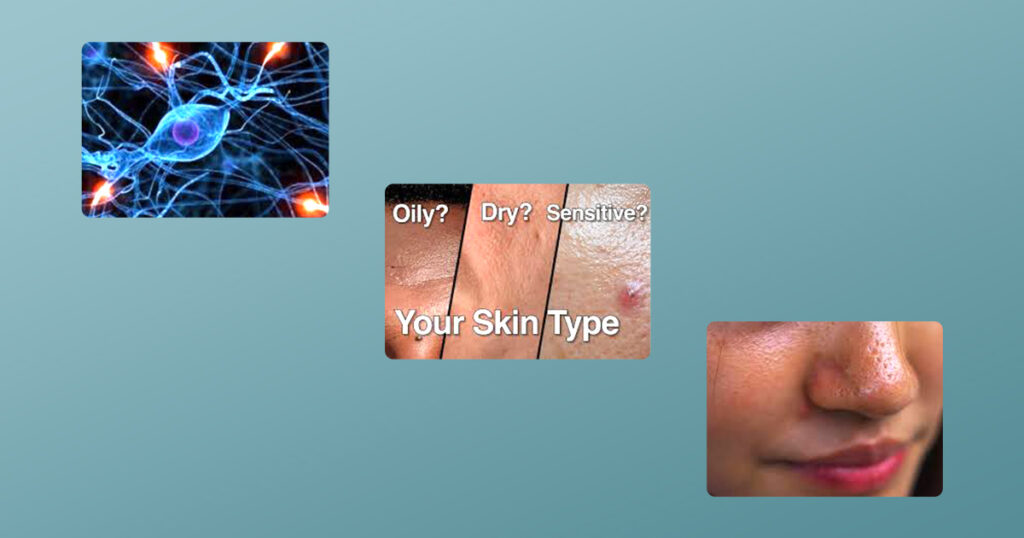
Understanding Teen Skin
Before diving into recommendations, it’s important to understand why teenage skin is different. During adolescence, the body produces more cholesterol (oil), which can clog pores and cause acne.
Cleansers: Start Here
Gentle Foaming Cleansers: Clean your face twice a day to remove dirt and oil without drying out your skin.
a. Epirich PE foaming cleanser: Good for normal to oily skin; helps keep skin hydrated.
b. Tabula rasa face cleanser: Contains salicylic acid to fight acne.
Micellar Water: Great for sensitive skin; cleanses without harsh scrubbing.
a. D wash face wash: Gently cleans and soothes skin.

Moisturizers: Stay Hydrated
Oil-Free Moisturizers: Even oily skin needs moisture. Choose products that won’t clog pores.
a. Akosma advanced skin repair moisturiser: Controls shine and reduces pores.
b. Raindew moisturiser: Includes SPF 30 for sun protection.
Hydrating Gel-Creams: Light and hydrating for combination or normal skin.
a. Neutrogena Hydro Boost Water Gel: Keeps skin soft and hydrated without feeling greasy.
b. Excela rich moisturiser: Deeply hydrating cream, ideal for very dry skin with nourishing ingredients like hyaluronic acid and ceramides.
Acne Treatments: Spot Solutions
Spot Treatments: Target specific pimples without drying out the whole face.
a. Clean & Clear Advantage Acne Spot Treatment: Reduces pimple size quickly.
b. Mario Badescu Drying Lotion: Dries out blemishes overnight.
All-Over Treatments: For more severe acne.
a. Proactiv Solution 3-Step System: Combines cleanser, toner, and treatment.
b. The Ordinary Niacinamide 10% + Zinc 1%: Reduces blemishes and balances oil.
Sunscreens: Protect Your Skin
Lightweight Sunscreens: Protect against UV rays and prevent breakouts.
a. Solreva XL sunscreen: Lightweight and good for acne-prone skin.
b. Nubase facial gel: Oil-free and protects against sun damage.
Tinted Sunscreens: Offers sun protection and a bit of coverage.
a. Rivela tinted sunscreen: Provides color and sun protection.
b. Australian Gold Botanical Tinted Face Sunscreen SPF 50: Natural ingredients and matte finish.
Face Masks: Weekly Care
Clay Masks: Remove impurities and control oil.
a. Aztec Secret Indian Healing Clay: Deep-cleans with natural clay.
b.Origins Clear Improvement Active Charcoal Mask: Draws out impurities with charcoal.
Hydrating Masks: Add extra moisture and soothe irritated skin.
a. Laneige Water Sleeping Mask: Hydrates while you sleep.
Simple Skincare Routine for Teenage Girls
Taking care of your skin as a teenager can be tricky because of the changes in your body. Here’s an easy skincare routine to keep your skin healthy and clear.
1. Cleanse: Starting and ending your day
- Morning and night: Wash your face twice a day to remove dirt and oil.
- Use a gentle cleanser: Choose a gentle cleanser that does not damage your skin.
- Example: Cetaphil gentle cleanser.
2. Toning: Balance Your Skin
- Reasons for use: Toner helps to balance your skin and tighten pores.
- Choose Alcohol-Free: Choose an alcohol-free toner to avoid drying out your skin.
- Example: Thayers Witch Hazel Toner.
3. Moisturizing: Keep Your Skin Moisturized
- Day and night: Moisturize your skin daily to keep your skin soft, even if it is oily.
- Oil-Free Moisturizer: Use a light, oil-free moisturizer.
- Example: Neutrogena Hydro Boost Water Gel.

4. Sun protection: Protect your skin
- Daily SPF: Always wear sunscreen, even on cloudy days.
- Choose SPF 30 or higher: Use sunscreen to protect against UVA and UVB rays.
5. Targeted treatment: Focus on problem areas
- Acne Treatments: Use a spot treatment with salicylic acid for acne.
- Example: Acne spot treatment Clean and clear.
- Exfoliate weekly: Gently scrub skin once or twice a week.
- Example: Paula’s Choice 2% BHA Exfoliant.
6. Healthy Habits: Glow from Within
- Food and Water: Eat fruits and vegetables and drink plenty of water.
- Sleep and Stress: Get 8 hours of sleep and manage stress to prevent breakdown.
Skincare Routine for Teenage Boys
Teenage boys often deal with oily skin, acne, and sensitivity due to hormonal changes. Here’s an easy skincare guide to keep your skin clear and healthy.
1. Cleansing: Start with a Clean Slate
- Daily Cleansing: Wash your face twice a day to remove excess oil and dirt.
- Foaming Cleaner: Choose a gentle, oil-free cleaner.
- Example: Neutrogena Male Invigorating Facial Wash.
Tips:
- Use warm water: Hot water can be too hard.
- Avoid bar soaps: It can dry out your skin.
2. Exfoliating: Remove Dead Skin
- Weekly exfoliation: Use the scrub 1-2 times a week to remove dead skin cells.
- Gentle scrub: Choose a scrub with salicylic acid or benzoyl peroxide.
- Example: Kiehl’s Facial Fuel Energizing Scrub.
Tips:
- Avoid over-exfoliating, as this can lead to irritation and increased oil production.
- Apply the scrub gently, using circular motions to avoid damaging the skin.
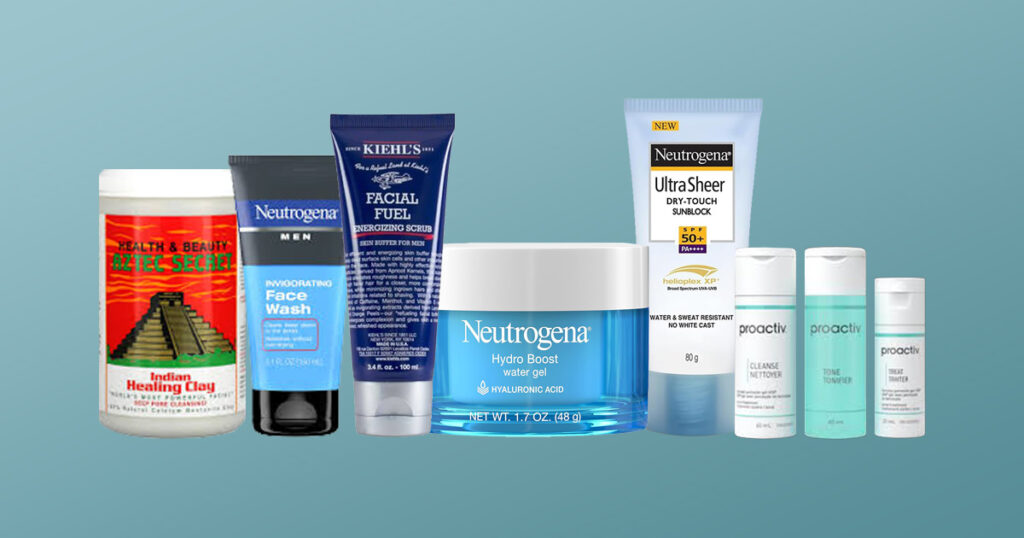
3. Moisturizing: Keeping the Skin Hydrated
- Regular Hydration: Even oily skin needs hydration. Use a light, non-greasy container.
- Oil-Free Moisturizer: Choose a non-comedogenic, oil-free moisturizer.
Tips:
- Apply moisturizer for teens immediately after cleansing to lock in moisture.
- For those with dry skin, a slightly richer formula may be necessary.
4. Sun Protection: Essential for Healthy Skin
- Regular Daily Sunscreen: Protect your skin from UV damage.
- Broad-spectrum SPF: Use a sunscreen with at least SPF 30.
Tips:
- Apply sunscreen as the last step in your morning skincare routine, 15 minutes before going outside.
- Reapply every two hours if you’re active outdoors or sweating.
5. Targeted Treatments: Addressing Specific Skin Issues
- Spot treatments: For acne, use products that contain salicylic acid.
- Example: Clean & Clear Advantage acne treatment.
- Local treatment: Use treatment locally for diffuse abscesses.
Tips:
- Avoid using too many acne products at once, as this can lead to irritation.
- Start with one product and see how your skin responds before adding more treatments.
6. Face Masks: Weekly Care
Clay Masks: Use once a week to control oil and clear pores.
- Example: Aztec Secret Indian Healing Clay.
Tips:
- Follow the mask instructions.
- Avoid using masks too often to prevent drying out your skin.
Conclusion
Dr. Hanan: Chennai’s Top Skin Care Specialist
Dr. Hanan is a Best dermatologist in Chennai, specializing in dermatology, cosmetic procedures. Her clinic offers personalized treatments for acne, anti-aging, pigmentation, and more, using the latest technology. Known for her compassionate care, Dr. Hanan ensures every patient receives tailored treatment.
Why Choose Dr. Hanan?
- Expert Care: Extensive experience in dermatology.
- Comprehensive Services: From acne to anti-aging.
- Advanced Technology: Cutting-edge treatments.
- Personalized Approach: Customized care plans.
For top-notch skincare in Chennai, Our Dr. Hanan is the best choice.
FAQ’s
The best skincare for teens with acne-prone skin include a gentle cleanser with salicylic acid, an oil-free moisturizer, and a non-comedogenic sunscreen.
Teens generally do not need anti-aging products. Instead, they should focus on sun protection and maintaining a simple skincare routine.
Teens should avoid skincare products with alcohol, fragrances, and harsh chemicals that can irritate sensitive skin.
Table of Contents
Hair Transplant Cost in India : Guide for 2025
Hair Transplant Cost in India : Guide for 2025
Discuss about Hair transplant cost in India and get tips on budget. Learn more here or contact Dr.hanan Dermatology Speciality Clinic.
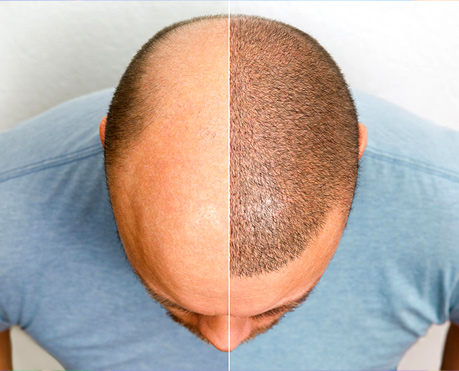
Hair loss is a very common problem affecting men and women of all ages. Fortunately, India has a variety of affordable hair treatments that not only help you hide the issue of hair loss, but also help prevent future recurrences.
In recent years, hair transplants have emerged as a popular solution for individuals who want to deal with hair loss issues. Known for its advanced medical technology and affordable healthcare, India has become a prime destination for those considering hair transplantation.
This article aims to provide an in-depth analysis of hair transplant price in India, to help potential patients make informed decisions about treatment options.
What is a hair transplant?
Hair transplant means move hair from one side of your head it’s called donar area of the head to an blad area with thinning or no hair. It can help your hair look good again. These implants have been practised by doctors in the US. since the 1950s, but techniques have improved dramatically.
Is hair transplant permanent?
Hair transplant treatments are permanent. Once your doctor gives you clearance, you can treat your replacement hair just like your normal healthy hair—wash, shampoo, and shampoo as usual. However, some hair transplants do not survive and a few hairs fall out.
Do you know that Ms Dhoni hair transplant and Virat Kholi did Hair Transplant Surgeries
Types of Hair Transplant Surgeries
There are two main types of hair transplants, both done in a doctor’s office. First, the surgeon cleans your scalp and numbs the back of your head. Then, they choose between two methods: follicular unit strip surgery (FUSS) or follicular unit extraction (FUE).
1.Follicular Unit Strip Surgery (FUSS)
In FUSS, the surgeon removes a 6- to 10-inch strip of skin from the back of your head or donar area and stitches the area closed. This strip is then cut into 500 to 2,000 tiny grafts, each with a few hairs. These healthy hair grafts are used to fill in thinning areas or bald area. FUSS is also known as follicular unit transplantation (FUT).
2.Follicular Unit Extraction (FUE)
3.FUSS vs. FUE
- Scarring: FUSS leaves a scar where the strip was removed, which may be visible if your hair is short. FUE leaves small, less noticeable scars.
- Time: FUSS typically takes time consuming than FUE.
- Appearance: FUSS doesn’t require shaving the back of your scalp.
- Risk: In FUE, there’s a risk of damaging hair follicles, which might prevent successful transplantation.
- Cost: FUE is generally more expensive than FUSS.
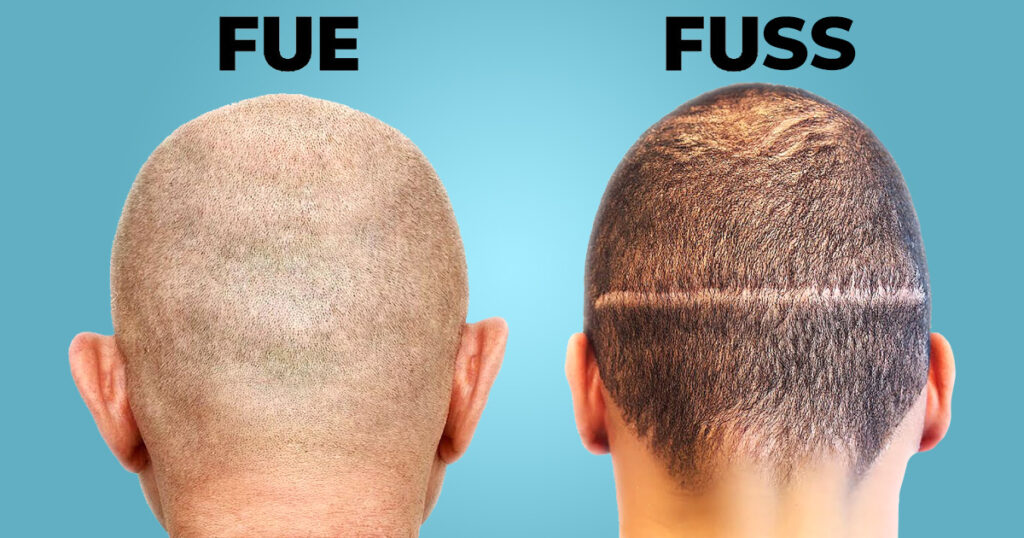
4.Artificial Hair Transplants
Artificial hair transplants use synthetic fibers to replace lost hair instead of using your own hair. These were created for people who don’t have enough hair for traditional transplants. However, the U.S. FDA banned artificial hair transplants in 1983 due to safety concerns.
Although they might be an option for some, artificial hair transplants can cause side effects because of the foreign materials used. If you’re considering a hair loss treatment, consult a board-certified doctor who specializes in hair loss.
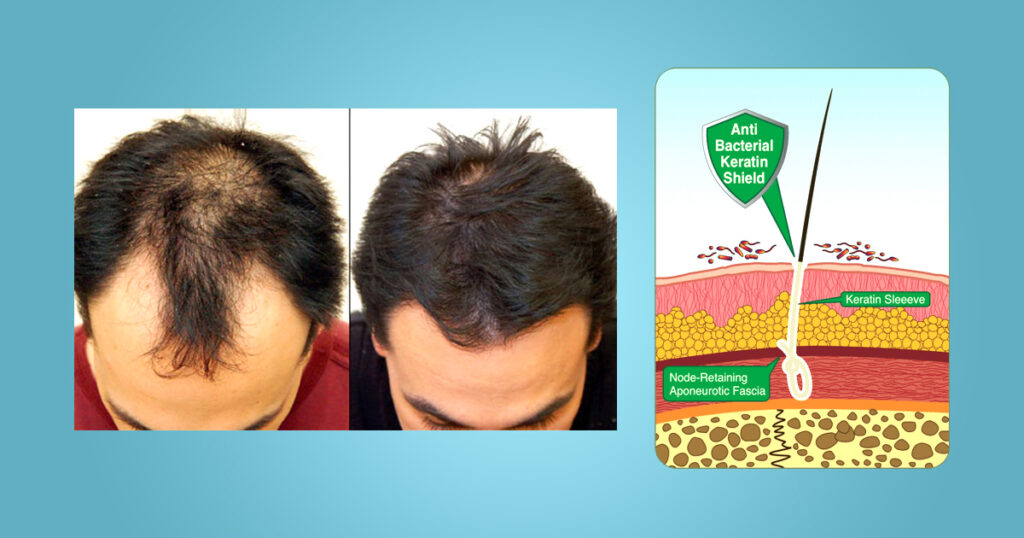
Factors affecting the cost of hair transplantation in India
Many factors influence the cost of hair transplant in India. Knowing these can help you plan your budget better.
Average Hair Transplant Cost in India
Hair transplant cost per hair in India and trasnplant in chennai varies widely based on the factors mentioned above. On average, the cost per graft ranges from ₹30 to ₹150 ($0.40 to $2) depending on the clinic and technique.
- FUT: Typically costs between ₹40,000 to ₹70,000 ($500 to $900) for 1,000 to 2,000 grafts.
- FUE: Generally costs between ₹60,000 to ₹1,50,000 ($800 to $2,000) for 1,000 to 2,000 grafts.
These prices may fluctuate based on the specific requirements of the patient and the clinic’s pricing policies.
Choosing the Best Clinic for Hair Transplant
Choosing the right hospital and managing costs is key to getting the best results. Here are some tips to help you:
1. Research and Analysis: Find information and read patient reviews about the quality of the hospital. Check online forums, social media, and patient profiles for useful information.
2. Check certificates: Make sure the surgeons at the hospital are qualified and experienced in hair transplantation. Check their credentials and credentials to ensure they are experts.
3. Compare costs: Get quotes from hospitals and compare their prices. Be wary of very low prices, as they may indicate low prices or hidden costs.
4. Consultation: Meet with hospitals to discuss your needs and treatment options. Take this time to tour the hospital facilities and meet the doctors.
Why Choosing Dr. Hanan for Best Hair Transplant Clinic in Chennai
When it comes to hair restoration, Dr. Hanan is renowned as the leading specialist in Chennai. His clinic is recognized for delivering exceptional hair transplant results with expertise, advanced technology, and personalized care. Here’s why Dr. Hanan is the top choice for the best hair transplant clinic in India.
1.Unmatched Expertise and Experience
Highly Qualified Specialist
Dr. Hanan is a board-certified dermatologist with specialized training in hair transplantation. With years of experience, Dr. Hanan delivers expert care and effective results.
Advanced Techniques
Utilizing the latest methods, including Follicular Unit Extraction and Follicular Unit Transplantation , Dr. Hanan provides minimally invasive and precise treatments for optimal hair restoration.
2.Cutting-Edge Facilities
Modern Technology
The clinic features state-of-the-art equipment and robotic-assisted systems to ensure precise and effective hair transplant procedure.
Comfortable Environment
Dr. Hanan’s clinic maintains a sterile and modern setting, prioritizing patient comfort and safety during every procedure.
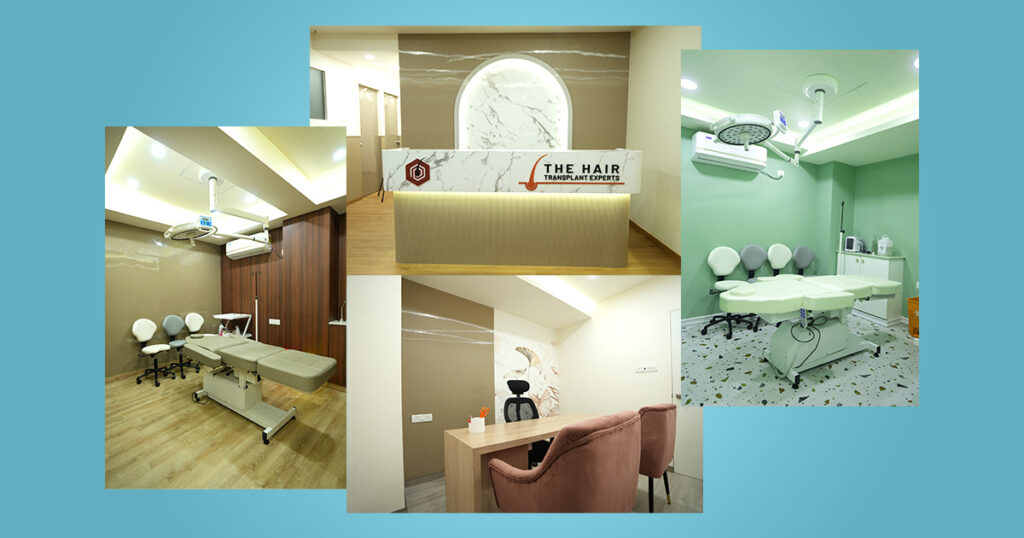
3.Comprehensive Hair Transplant Services
Personalized Treatment
Dr. Hanan offers customized treatment plans tailored to individual needs, ensuring natural-looking results and high patient satisfaction.
Post-Transplant Care
Comprehensive post-transplant care includes detailed aftercare instructions and follow-up support in your recovery time to ensure optimal results.
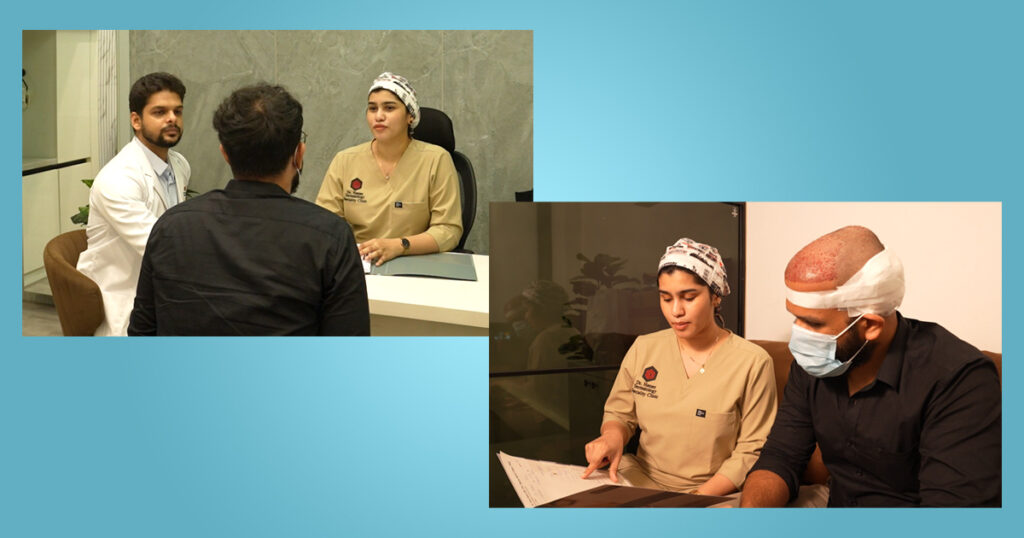
4.Patient-Centered Approach
Consultative Care
Dr. Hanan takes a personalized approach, listening to patient goals and providing clear, honest information about the process.
Holistic Support
Beyond the transplant, Dr. Hanan offers advice on lifestyle and hair care to maintain and enhance results.
Patient Education
Educating patients is a key aspect of Dr. Hanan’s practice. Dr. Hanan ensures that patients fully understand their diagnoses, treatment options, and preventive measures. This empowers patients to make informed decisions about their skin health and maintain optimal results.
5.Exceptional Patient Reviews and Testimonials
Positive Patient Experiences
Dr. Hanan’s clinic has received numerous positive reviews and testimonials from satisfied patients. These reviews highlight Dr. Hanan’s expertise, compassionate care, and commitment to excellence. The positive feedback is a testament to the high-quality care provided at the clinic.
Success Stories
Dr. Hanan regularly shares success stories and case studies to showcase the effectiveness of treatments and the positive impact on patients’ lives. These stories demonstrate Dr. Hanan’s ability to achieve outstanding results and improve patients’ skin health and confidence.
6.Convenient Location and Flexible Scheduling
Prime Location in OMR
Dr. Hanan’s clinic is conveniently located in the heart of OMR, making it easily accessible for patients from all parts of the city. The central location ensures that patients can reach the clinic without hassle.
Visit Us : Dr. Hanan Dermatology Speciality Clinic, A Block, Gem Bhoomi & Buildings, Padur, OMR, Chennai – 603103
Flexible Appointments
Understanding the busy schedules of patients, Dr. Hanan offers flexible appointment options, including extended hours and weekend appointments. This ensures that patients can receive the care they need at a time that is convenient for them.
For Enquiries / Appointments : +91 6381048403
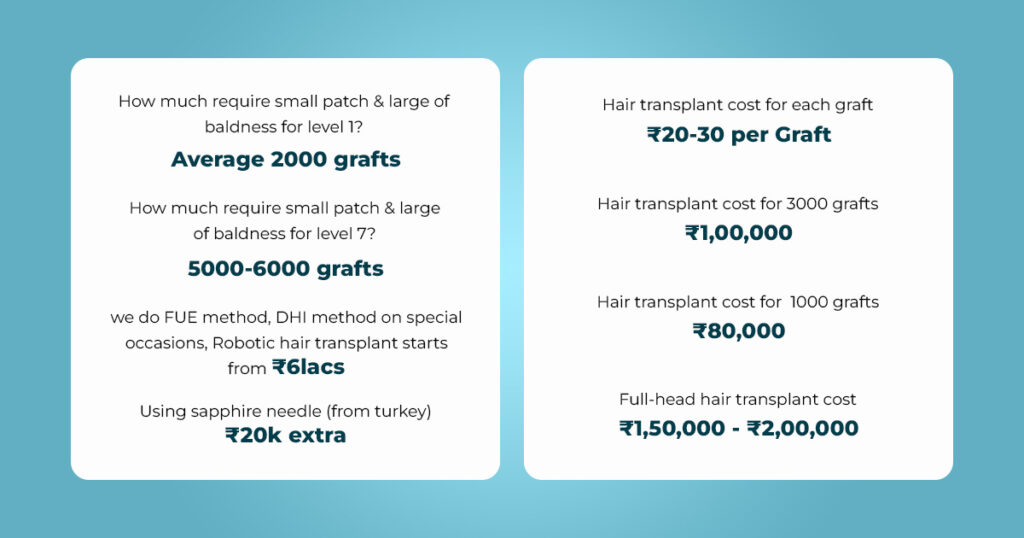
Conclusion
Hair transplantation surgeries is a transformative procedure for individuals facing hair loss, and India offers affordable and quality options. By understanding the factors that affect grafts hair transplant cost and following research whole you will be able to make an informed decision and get the best results for your hair restoration journey.
FAQ’s
There is no “perfect” age for a hair transplant, most surgeons recommend waiting until your late 20s or early 30s when hair loss patterns are more established.
The procedure is performed under local anesthesia, so you should not feel pain during the surgery. Some discomfort or soreness may occur afterward, but it can be managed with pain medication.
Hair transplant results are typically permanent, as the transplanted hair follicles are resistant to the effects of DHT, the hormone responsible for hair loss.
Table of Contents
For FUE Hair Transpalnt, the surgeon shaves a section of the back of your area of the scalp and removes hair follicles one by one. The donar area heals with small dots that are covered by your existing hair. After harvesting the hair, FUSS and FUE hair trasnplant procedures are similar: the surgeon prepares the grafts, numbs the area where the hair will be placed, makes tiny holes, and carefully inserts each graft.
The whole process usually takes 4-8 hours. You might need another procedure later if you continue to lose hair or want a fuller look.
1. Clinic Reputation and Location
The clinic’s name and location affect the average cost. Well-known clinics in big cities like Mumbai, Delhi, Chennai, and Bangalore usually charge more because they have advanced facilities and experienced surgeons. Smaller city clinics may offer lower prices.
2.The skill of a surgeon
The surgeon’s experience and knowledge are crucial. Highly skilled and famous hair transplant surgeons may charge more, but their expertise often leads to better results and fewer complications.
3.Technique Used
The technique chosen, FUT or FUE, impacts the cost. FUE is generally more expensive than FUT because it’s less invasive and requires more precision. The cost per graft is higher with FUE due to advanced technology and skill.
4. Number of Grafts Required
The total cost depends on the number of hair grafts required. More severe hair loss needs more grafts, increasing the cost. Clinics usually estimate costs based on graft numbers, ranging from 1,000 to 4,000 or more.
5. Additional Services
Extra services like pre-op treatment, post-op care, medications, and follow-up visits can add to the total cost. Some clinics offer packages that include these services, providing better value for money.
Top 10 Dermatologist in Chennai: For Skin and Hair Problems
Top 10 Dermatologist in Chennai: For Skin and Hair Problems
Discover Top 10 Dermatologist in Chennai for top-notch skin care and treatments. Get expert advice and quality service.
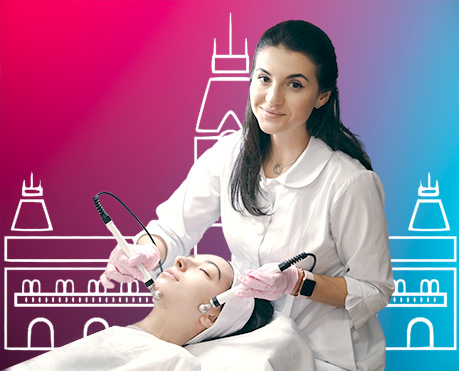
In a bustling city like Chennai, it is important to find a qualified and consult a dermatologist who will give you a healthy glowing skin. Whether you are dealing with chronic skin conditions, want to achieve a healthy skin tone or just want regular skin care, Chennai welcomes the best dermatologist in India.
Here we are the top 10 dermatologists in Chennai known for their expertise, patient care and innovative treatments.
Top 10 Dermatologist in Chennai
1. Dr. R. Amin Hanan
Expertise and Background
Dr. R. Amin Hanan is a renowned dermatologist and trichologist with a focus on skin hair and nail disorders. Founder of Dr.Hanan Dermatology Speciality Clinic is best skin and hair clinic in chennai
Services Offered
- Hair Loss Treatments: Innovative solutions for hair loss and baldness.
- Skin Rejuvenation: Treatments to restore skin vitality.
- Psoriasis Management: Effective therapies for psoriasis.
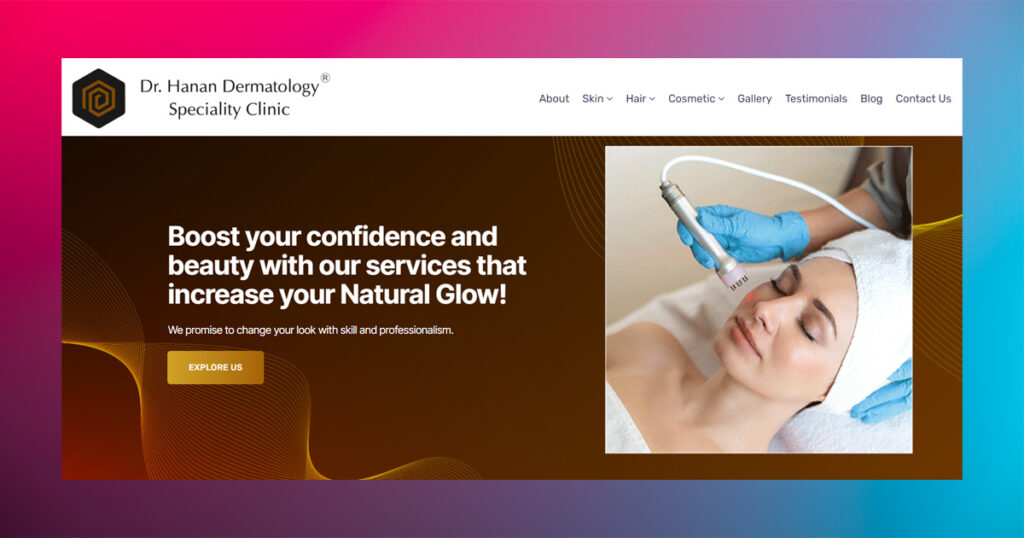
Patient Care
Dr.Hanan patients value his expert care and personalized treatment plans.
2. Dr. S. Murugusundram
Expertise and Background
Dr. S. Murugusundram, the founder of the Chennai Skin Foundation and Yesudian Research Institute, has over two decades of experience in dermatology. He is widely recognized for his specialization in hair and skin treatments.He is one of the best skin doctor in chennai.
Services Offered
- Hair Transplantation: Utilizing advanced techniques for natural-looking results.
- Vitiligo Treatment: Comprehensive care for pigmentation disorders.
- Laser Treatment: State-of-the-art laser therapy for various skin conditions.
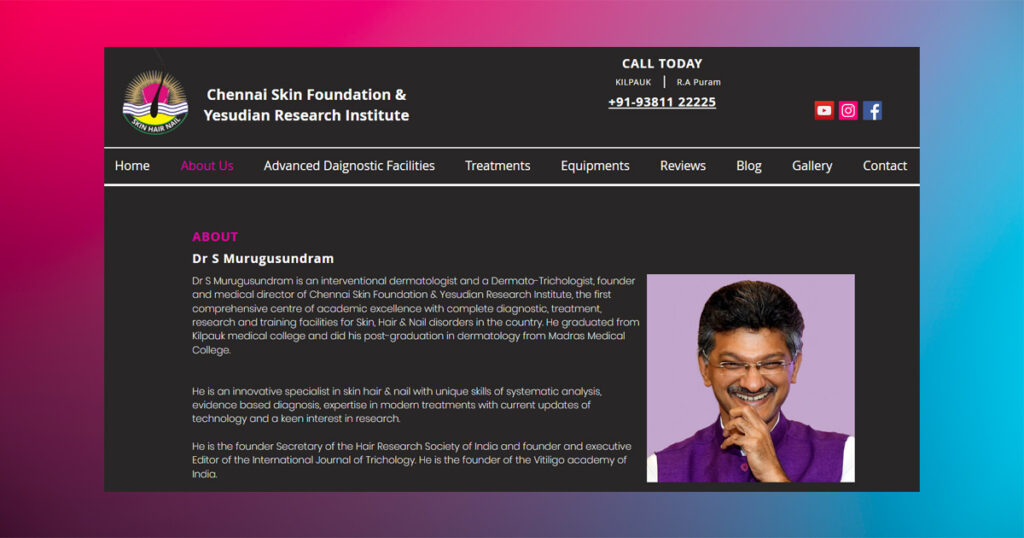
Patient Care
Dr. Murugusundram is praised for his patient-centric approach, ensuring personalized and effective treatment plans.
3. Dr. Maya Vedamurthy
Expertise and Background
Dr. Maya Vedamurthy, director of RSV Skin Clinic and senior consultant at Apollo Hospital, Chennai, has over 30 years of experience. She excels in clinical dermatology, cosmetic dermatology, and dermatologic surgery. Dr maya is the best skin specialist in chennai.
Services Offered
- Acne Treatment: Effective management of acne and acne scars.
- Dermatologic Surgery: Procedures for skin cancers and cysts.
- Anti-Aging Treatments: Non-surgical treatments to reduce signs of anti aging.
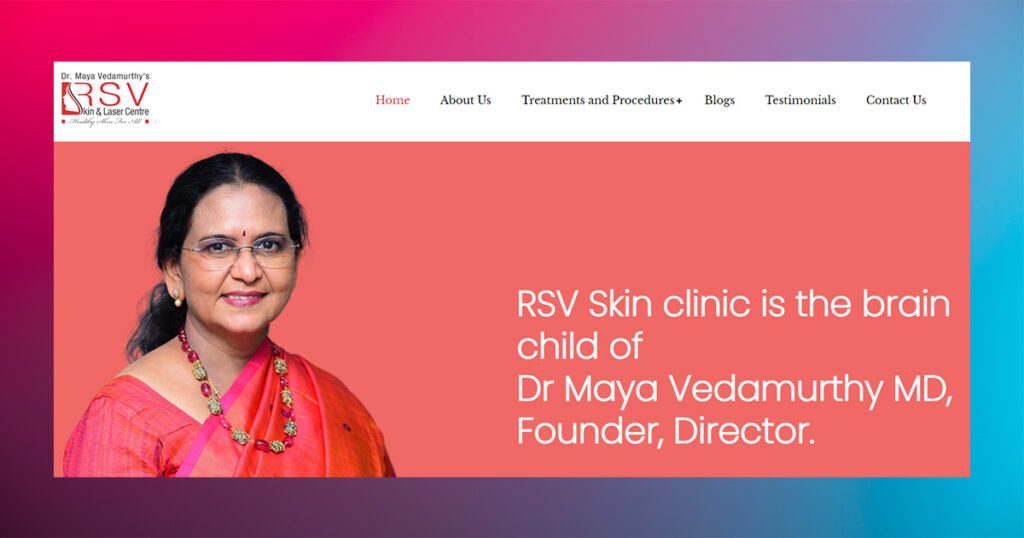
Patient Care
Dr. Vedamurthy’s compassionate care and thorough treatments are highly appreciated by her patients.
4. Dr. Sasikumar Muthu
Expertise and Background
Dr. Sasikumar Muthu, founder of Pearl Skin and Hair Clinic, is known for his expertise in both medical and cosmetic. He is the best dermatologist in chennai. His clinic offers high standards of care with cutting-edge treatments.
Services Offered
- Psoriasis Treatment: Innovative therapies for managing psoriasis.
- Hair Loss Treatments: Comprehensive solutions for hair fall and baldness.
- Skin Rejuvenation: Advanced treatments for skin revitalization.
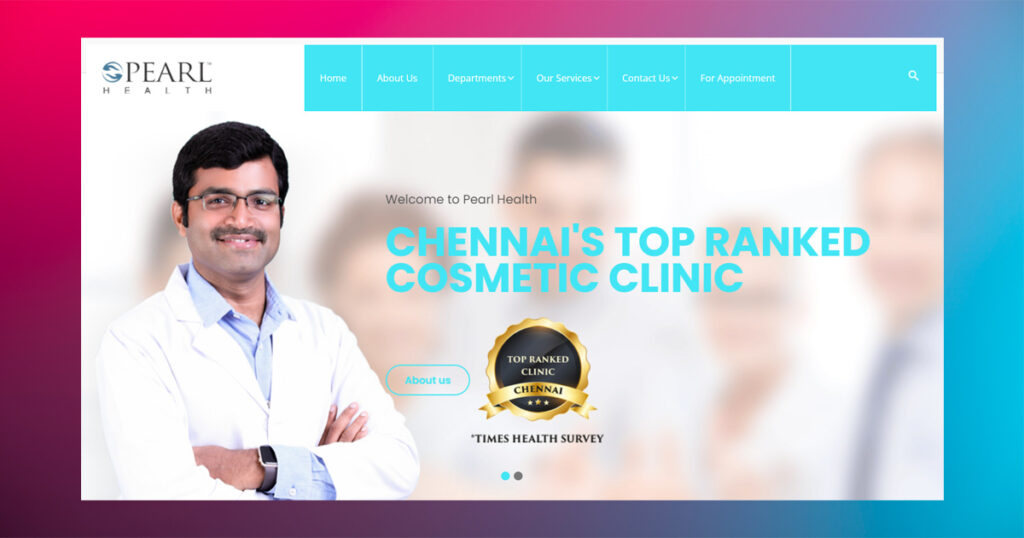
Patient Care
Dr. Sasikumar Muthu detailed consultations and effective treatment plans set him apart.
5. Dr. Karthik Gopal
Expertise and Background
Dr. Karthik Gopal, practicing at Apollo Hospitals, Chennai, has significant experience in treating complex skin disorders and performing aesthetic procedures.
Services Offered
- Eczema and Dermatitis: Specialized treatments for inflammatory skin conditions.
- Laser Hair Removal: Safe and effective hair removal procedures.
- Chemical Peels: Customized peels for various skin concerns.
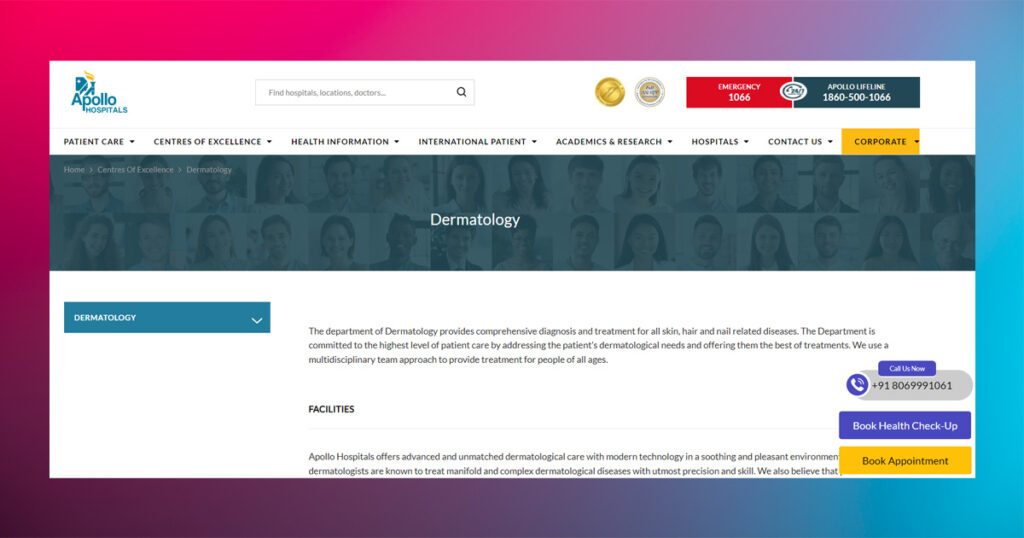
Patient Care
Dr. Gopal is known for his personalized and attentive approach to patient care.
6. Dr. Renita Rajan
Expertise and Background
Dr. Renita Rajan, chief consultant at Render Skin and Hair, is an expert in aesthetic dermatology. dr renita rajan is known for her innovative approach to skin and hair care.
Services Offered
- Pigmentation Treatment: Advanced solutions for hyperpigmentation and melasma.
- Botox and Fillers: Non-surgical treatments for wrinkle reduction and facial contouring.
- Dermatopathology: Accurate diagnose and treat skin diseases through microscopic examination.
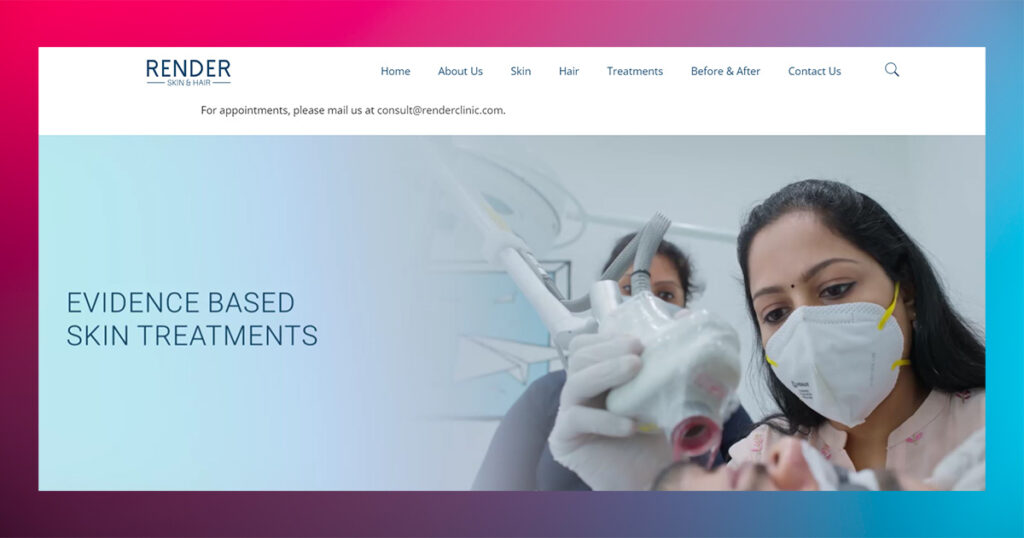
Patient Care
Dr. Rajan’s meticulous care and serene clinic environment are highly valued by her patients. She is the top skin doctor in chennai
7. Dr. A. Ariganesh Chandrasegaran
Expertise and Background
Dr. A. Ariganesh Chandrasegaran, founder of DermaClinix, is known for his expertise in hair transplantation and cosmetic dermatology.
Services Offered
- Hair Transplantation: Cutting-edge techniques for hair restoration.
- Acne Scar Treatment: Advanced treatments for reducing acne scars.
- Laser Treatment: Effective solutions for various skin issues.
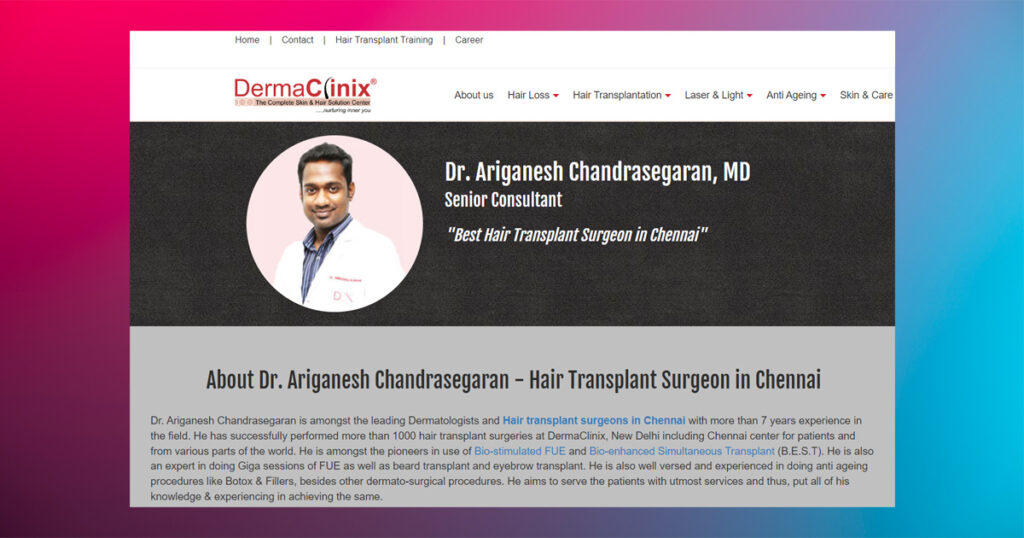
Patient Care
Dr. Ariganesh’s patient-focused approach ensures customized care and excellent results.
8. Dr. Nirmala Subramanian
Expertise and Background
Dr. Nirmala Subramanian is a senior consultant cosmetic dermatologist with extensive experience in clinical and cosmetic dermatology.
Services Offered
- Psoriasis and Eczema: Specialized treatments for chronic skin conditions.
- Anti-Aging Solutions: Non-invasive treatments for youthful skin.
- Laser Hair Removal: Advanced techniques for permanent hair reduction.
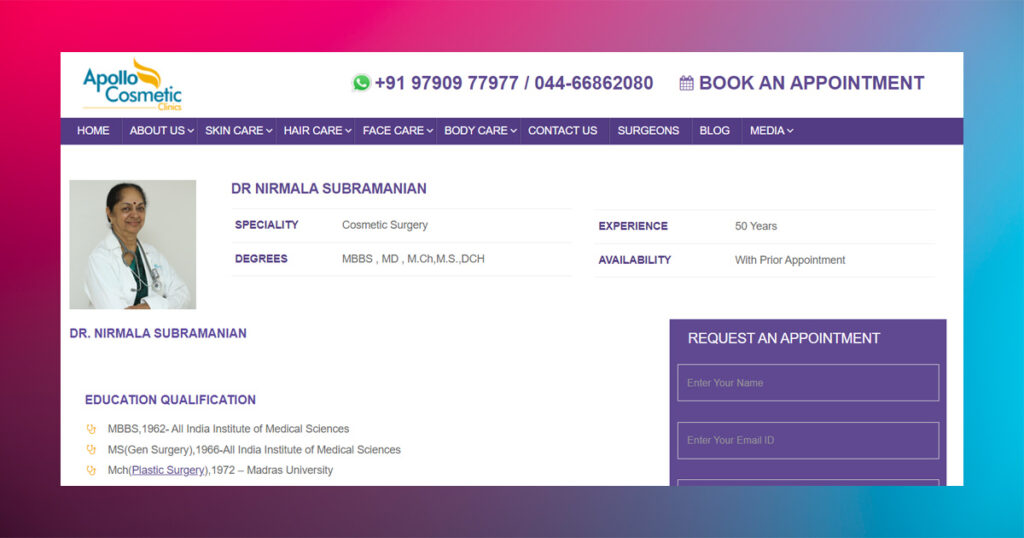
Patient Care
Dr. Subramanian is known for her empathetic and effective treatment strategies.
9. Dr. R. Krishnamoorthy
Expertise and Background
Dr. R. Krishnamoorthy, join director & senior consultant at SIMS, has vast experience in treating various skin disorders and performing dermatologic procedures.
Services Offered
- Vitiligo Surgery: Advanced surgical treatments for vitiligo.
- Skin Allergy Treatment: Effective management of allergic skin conditions.
- Cosmetic Procedures: Non-surgical treatments for skin enhancement.
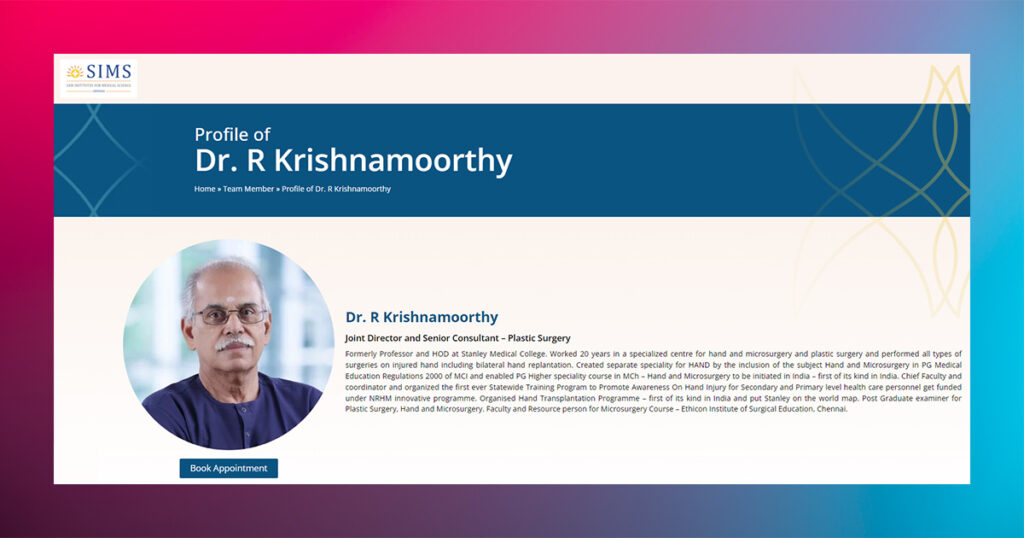
Patient Care
Dr. Krishnamoorthy’s patients appreciate his detailed consultations and effective treatments.
10. Dr. G. Ravichandran
Expertise and Background
Dr. G. Ravichandran is a seasoned dermatologist with a focus on clinical and aesthetic dermatology. He practices at Apollo Hospital.
Services Offered
- Acne Management: Comprehensive treatments for acne and skin related issues.
- Laser Resurfacing: Advanced laser treatments for skin rejuvenation.
- Scar Revision: Effective solutions for reducing the appearance of scars.
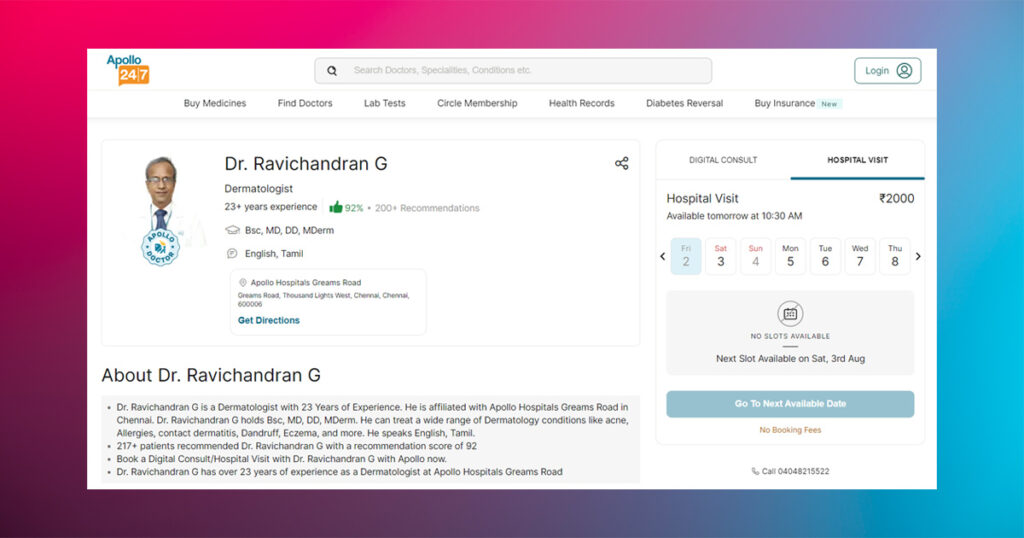
Patient Care
Dr. G. Ravichandran is praised for his thorough and patient-centered approach.
Conclusion
The dermatologists listed above are the top dermatologists in Chennai. They have a lot of experience and work at well-known healthcare places.
If you need help with your skin, consider seeing Dr. Hanan is the best female dermatologist in chennai. She offers free advice on skin care and listens to patients about their skin problems.
Visit Our Dr.Hanan Dermatology Clinic located on omr road, padur, Chennai – 603103.
FAQ’s
They specialize in a variety of treatments including acne management, eczema treatment, psoriasis care, hair loss solutions, skin allergy treatment, pigmentation correction, and cosmetic procedures like chemical peels, laser therapy, and Botox injections.
Yes, many top dermatologists in Chennai offer online consultations through their websites or telemedicine platforms, making it convenient for patients who cannot visit the clinic in person.
Appointments can usually be booked online through the dermatologist's official website, by calling the clinic directly, or via healthcare platforms like Practo and Lybrate.

